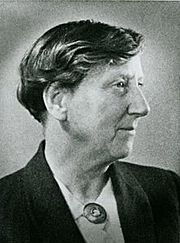Beatrice Blackwood facts for kids
Quick facts for kids
Beatrice Blackwood
|
|
|---|---|
 |
|
| Born | 3 May 1889 London, England
|
| Died | 29 January 1975 (aged 85) |
| Nationality | British |
| Known for | Anthropology |
Beatrice Mary Blackwood (born May 3, 1889 – died November 29, 1975) was an important British anthropologist. An anthropologist is a scientist who studies humans, their societies, cultures, and how they developed over time. Beatrice Blackwood was in charge of the famous Pitt Rivers Museum in Oxford, England, from 1938 until she retired in 1959.
Contents
Early Life and Learning
Beatrice Blackwood was born in London on May 3, 1889. Her father was a publisher. When she was younger, she studied in Germany. There, she learned German, Latin, and Greek.
University Studies
Beatrice went to Somerville College, Oxford in 1908. She studied English Literature and Language there until 1912. Later, in 1916, she returned to Oxford to study anthropology. She did very well and started working in the Human Anatomy Department at Oxford.
First Jobs and Degrees
In 1918, Beatrice became a research assistant. She helped a scientist named Arthur Thomson. She also started teaching about physical anthropology. This is the study of human evolution and how our bodies are different. She worked with collections of human anatomy.
At that time, women were not officially allowed to get degrees from Oxford. But in 1920, the rules changed. Beatrice Blackwood was able to get both her Bachelor of Arts (BA) and Master of Arts (MA) degrees on the same day! In 1923, she also earned a Bachelor of Science (B.Sc.) in Embryology. Embryology is the study of how living things develop before birth.
Studying in America
In 1924, Beatrice traveled to North America. She received a special scholarship called the Laura Spelman Rockefeller Fellowship. She used this to study anthropology in different groups of people. These included Native American, African-American, Asian, and Caucasian societies. During this trip, she collected many items. These items were added to the Pitt Rivers Museum collection. She also helped with a survey for the National Research Council.
Her Career as an Anthropologist
When Beatrice returned to Oxford in 1928, she got a promotion. She became a University Demonstrator and Lecturer in Ethnology. Ethnology is the study of different cultures and their relationships.
Research in New Guinea
A year later, in 1929, she received money from Yale University and other groups. This allowed her to travel to New Guinea for 18 months. She worked in the Northern Solomon Islands. Her research from this trip was published in a book in 1935. It was called Both Sides of Buka Passage. This book described the cultures she studied.
In 1936, Beatrice became a University Demonstrator in Ethnology at the Pitt Rivers Museum. Around the same time, she went on her second field study trip. This time, she explored parts of Papua New Guinea that were not yet fully explored. During her travels, she collected over 2,000 items. These items were very important additions to the Pitt Rivers Museum's collections.
Leading the Pitt Rivers Museum
In 1938, Beatrice returned to Oxford. She and Tom Penniman were chosen to lead the Pitt Rivers Museum. They created a new system. This system helped volunteers organize the museum's records. It also helped them catalog all the items in the museum's collections.
In 1946, Beatrice Blackwood became a lecturer in Ethnology at Oxford. She continued to teach archaeology and anthropology. She taught students who wanted to earn a Diploma in Anthropology.
Later Life and Legacy
Beatrice Blackwood retired from the Pitt Rivers Museum in 1959. But even after she retired, she kept working. She continued to help organize the museum's collections.
In 1970, she published a book called The Classification of Artefacts in the Pitt Rivers Museum. She wrote this book because researchers from the Smithsonian Museum asked her to. Beatrice Blackwood was still working at the museum almost every day. She continued to work there until just a few days before she passed away in 1975.
Awards and Special Recognition
Beatrice Blackwood received several important awards and honors for her work:
- She was chosen as a Fellow of the Royal Anthropological Institute (FRAI) in 1921. This is a high honor for anthropologists.
- In 1943, she was chosen as a Fellow of the Society of Antiquaries of London (FSA). This is for people who study history and old objects.
- Also in 1943, she received the Rivers Memorial Medal. This medal is given by the Royal Anthropological Institute for important contributions to anthropology.
 | William Lucy |
 | Charles Hayes |
 | Cleveland Robinson |

